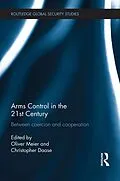This volume evaluates the impact of coercive arms control efforts to curb the spread of weapons of mass destruction in the twenty-first century.
Autorentext
Oliver Meier is a senior researcher with the Institute for Peace Research and Security Policy at the University of Hamburg, and the International Representative and Correspondent of the US Arms Control Association.
Christopher Daase is Professor for International Organization at the University of Frankfurt.
Inhalt
Preface Part I: Introduction 1. Introduction, Christopher Daase and Oliver Meier Part II: Is there a Paradigm Shift in Arms Control? 2. The Changing Role of Arms Control in Historical Perspective, Alyson JK Bailes 3. Non-Cooperative Arms Control, Oliver Meier 4. Coercion and the Informalization of Arms Control, Christopher Daase Part III: Effectiveness and Legitimacy of New Arms Control Instruments 5. The Effectiveness and Legitimacy of the Use of Force to Prevent Nuclear Proliferation, Martin B. Malin 6. The Role of Sanctions in Non-Proliferation, Michael Brzoska 7. The Proliferation Security Initiative: Effective Multilateralism or "Smoke and Mirrors"?, Ian Davis Part IV: Prospects for a New Arms Control Agenda - Diverging Views 8. A Non-Proliferation (r)Evolution:US Arms Control and Non-Proliferation Policy under Bush and Obama, Caroline Fehl 9. A New Transatlantic Approach? A View from Europe, Gerrard Quille 10. Prospects for a New Arms Control Agenda: An Indian Perspective, Arundhati Ghose 11. Prospects for a New Arms Control Agenda: View from the Middle East, Emily B. Landau Part V: Conclusion 12. The Changing Nature of Arms Control and the Role of Coercion, Christopher Daase and Oliver Meier
